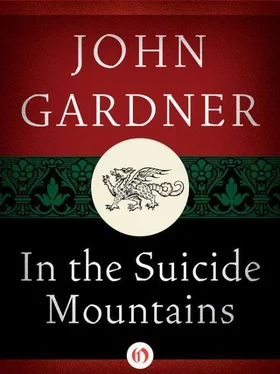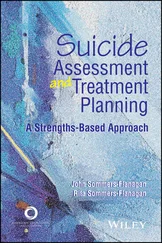The abbot was saying: “I tell you the story — among other reasons — to remind you, dear friends, lanterns to my darkness, of a point that may possibly have slipped your minds — the moral, that is, that I called your attention to earlier: Things are not always as they seem .” He began pacing back and forth by the window, head bowed. “I know very little about the world, of course—” The abbot glanced shyly past his shoulder at them, gauging the effect his words were having, then started again: “I know, I say, very little about the world, cut off from things here on my mountain, so what I say may be foolishness. Nevertheless, it seems to me that there’s a great truth in that tired old saw.” He spoke the tired old saw one more time, lovingly, separating the phrases, and it came to Armida that he’d no doubt said it from the pulpit many times, if abbots did, as she was inclined to believe, sometimes preach: “ Things… are not always… as they seem .”
Gazing up at the prince, his face just visible in the red coals’ glow, Armida was surprised that she should see, even now, no trace of a smile. If he had any intelligence at all, it seemed to her, he’d see the humor in the abbot’s old-womanish maunderings. Yet on the other hand it was touching to her that Prince Christopher should take in this hackneyed lecturing with such solemn innocence, such— what should she say? — sweet openness of soul. She was surprised— shocked — by the sudden recollection that the prince had spoken of suicide. “I mustn’t let him,” she thought. “That’s all there is to it!”
She remembered all at once how the dwarf had bawled after her on the mountain road, “Armida, don’t do it! Don’t kill yourself!” and how he’d whooped and sobbed. She remembered his bellowing, “It is my business. It’s very much my business!” She understood that now more clearly than she had at the time — and felt ashamed of herself. The tables had been turned on her: it was now Armida prepared to run shamelessly after the creature she loved, prepared to wail, as the dwarf had wailed, “Think of the people who love you! Think of how they’ll feel!” Yet could she stop him from doing it? She was stronger than he, she had no doubt of that, and she was sure she could easily outsmart him. But her love for him put a constraint upon her: because she loved him, respected him as he couldn’t respect himself, she was blocked, strange to say, from interfering. To control him, even for his own benefit, would be to diminish him, cheapen the value of his life — in his own eyes and even in hers. None of which was to deny that the prince’s desire to kill himself was a sickness, as certainly a disease as those coughings and witherings and jerkings which the abbot each night knelt to cure. Nevertheless …
Armida wrung her hands, squinting into the glow of the coals beyond his legs. Because she loved him it was imperative that she be worthy of him, yes — be, insofar as was possible for her, the Dream Woman every man desires: soft and tender, gentle, shy as a violet in the woods. O cruel irony! Such a woman, of course, would have no possible means of preventing his self-destruction. He would brush her away like a feather, outwit her and storm off, wild-eyed, and be gone. Only if she could cause him to love her in return, spare his life for her sake …
Suddenly, looking up at his face, the features as still as the features of a lighted marble statue, Armida once again began to weep. No one noticed except Chudu the Goat’s Son, and instantly he too began to cry. They both bent forward and shook with silent sobs, covering their faces with their hands, unaware that they were practically invisible in the room’s thick darkness.
The abbot was droning on, just perceptibly smiling in the pale light the stars cast, occasionally gesturing with a mild little tilt of the head, the slight movement of a silhouetted arm. “That’s the trouble, you see, with suicide. It may be that one has misapprehended the situation, that what seems so terrible and bitter in life as to make the race not worth the candle is in fact nothing more than some particularly seductive illusion, perhaps mere bad chemistry. A ripple of breath across the letter might in fact change all the writing. A little kick at the base of a tree might illuminate new golden options!”
The prince sighed profoundly. “Not in my case,” he said.
The abbot, too, heaved a sigh, and once more, for an instant, a tremble seized his lips. “Yes yes, I can see it’s desperate, in your case. And yet I wish — I hope not out of sinful curiosity — I wish I knew more of the particulars. It’s many a grief for which God is relief and perhaps one or two for which I am.”
“The tale can be quickly told,” said the prince. “My father has sent me to hunt down the six-fingered man.”
The old abbot’s mouth dropped open in dismay. Startled out of his normal tranquillity, he seemed for an instant a completely different man. He waved his hand, as if quite involuntarily, in the direction of his eyes, and Armida, looking up past her own hands, that instant, noticed through her tears, or thought she noticed (but it was dark, as I’ve mentioned), that the long, pale, delicate fingers numbered six, not five! But she couldn’t quite believe it, or failed to register — lost, as she was, in her own unhappiness and eagerly siding with the abbot’s arguments, since he was trying to persuade Prince Christopher to continue living. Seeing (or imagining she saw) that sixth finger, Armida merely shivered, as if a bad dream had slipped into her mind and out again. And now the abbot’s face was more gentle than ever, the tilt of his head more concerned.
“The six-fingered man!” he breathed. “God be with you, dear Prince!”
“I’m no fighter,” said Prince Christopher. “I’d never have a chance, and my death would be vile and ignominious. I won’t have it; I won’t go to him. I’d far rather die by my own hand. I may not be free to live like a poet, but I can die like one!” He stood with his right hand pressed against his chest.
“Yes, I see,” said the abbot. With sad eyes the abbot looked over in the direction of Armida and the dwarf (the dwarf was fast asleep), sitting in the darkness with their hands covering their faces. “Yes, you’re right,” said the abbot with a kind of groan, and began once more to pace. “You really do have no chance against the six-fingered man. How would you even find him? I understand he’s very clever — murders people, or so rumor has it, and steals their identities. How’s a man even to locate a fiend like that?” He shot a glance at the prince. “You have a clue?”
“Nothing,” moaned the prince.
“Well, no matter anyway. You’re right about this business, though it grieves me to say it. Heaven knows there’s no percentage in your facing that man. — Of course he’s not as young as he used to be, and there are always aspects of the situation that we’re not aware of. But you’re right, yes. Safer to do battle with a thousand-year-old dragon.”
The abbot stopped pacing as if he thought he’d heard a distant cry or something, and then his eyes lit up. He began to smile, excited, and came hurrying across the thick carpet toward the prince. He stopped a few feet short and looked up toward the corner of the ceiling, rapt, as if seeing a vision. “Now there’s an idea!” he said.
Christopher the Sullen turned and looked doubtfully up in the direction in which the abbot was looking.
“Listen to me,” the abbot said, moving closer and peering into Christopher’s eyes. “No one could call it ignominious, now could they, if you lost your life in battle against a dragon? A man’s not really expected to have a chance against a dragon. On the other hand, even while you’re dying”—he rolled his eyes, made his voice more dramatic, waved the silhouette of an arm then quickly returned it to his cassock, “—even while you’re gasping out your final breath, locked in mortal combat, you just conceivably might get in a lucky stab and leave the dragon so sorely wounded that—” His eyes flashed lightning and he gazed once more up at the corner of the room: “—so sorely wounded that he would eventually die. In a week or so, perhaps. Think of it! The lot of mankind would be significantly improved. You’d be famous throughout the world, throughout all history like Saint—” He pursed his lips; the name had slipped out of his memory. “Never mind, you get the drift.”
Читать дальше












